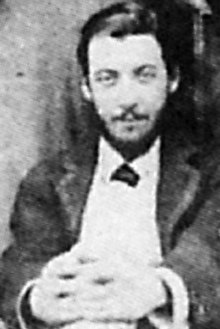Willie Wilde
| Willie Wilde | |
|---|---|
 |
|
| Born | William Charles Kingsbury Wilde 26 September 1852 Dublin, Ireland |
| Died | 13 March 1899 (aged 46) Chelsea, London, England |
| Occupation | Journalist, poet |
| Language | English |
| Genre | Journalism, poetry |
| Relatives |
Jane Wilde (mother) William Wilde (father) Oscar Wilde (brother) |
William 'Willie' Charles Kingsbury Wilde (26 September 1852 – 13 March 1899) was an Irish journalist and poet of the Victorian era and the older brother of Oscar Wilde.
Willie was the oldest son born into an Anglo-Irish family, at 21 Westland Row, Dublin, to Sir William Wilde and his wife Jane Francesca Wilde (née Elgee) (her pseudonym being 'Speranza'). Their second son, Oscar, was born in the same house in 1854. Jane Wilde was a successful writer, being a poet for the revolutionary Young Irelanders in 1848 and a lifelong Irish nationalist. Sir William was Ireland's leading Oto-Ophthalmologic (ear and eye) surgeon and was knighted in 1864 for his services to medicine. William also wrote books on archaeology and folklore. He was a renowned philanthropist, and his dispensary for the care of the city's poor, in Lincoln Place at the rear of Trinity College, Dublin, was the forerunner of the Dublin Eye and Ear Hospital, now located at Adelaide Road.
In June 1855, the family moved to 1 Merrion Square in a fashionable residential area, where Wilde's sister, Isola, was born in 1856. Here, Lady Wilde held a regular Saturday afternoon salon with guests including Sheridan le Fanu, Samuel Lever, George Petrie, Isaac Butt and Samuel Ferguson.
In February 1864, Willie and Oscar were sent to board at the Portora Royal School at Enniskillen in Ulster, where Willie became known for his good-humour and friendliness, later being described by a classmate as "clever, erratic and full of vitality". Oscar became known to his school fellows by the nickname 'Grey Crow', which he disliked, while Willie was 'Blue Blood'. Willie was "an accomplished pianist and an artist of little talent' Oscar Wilde later recalled that the headmaster, Dr Steele, had told him that “If I went on studying as I had been during the last year I might yet do as well as my brother Willie, and be an honour to the school and everyone connected with it.”
...
Wikipedia
